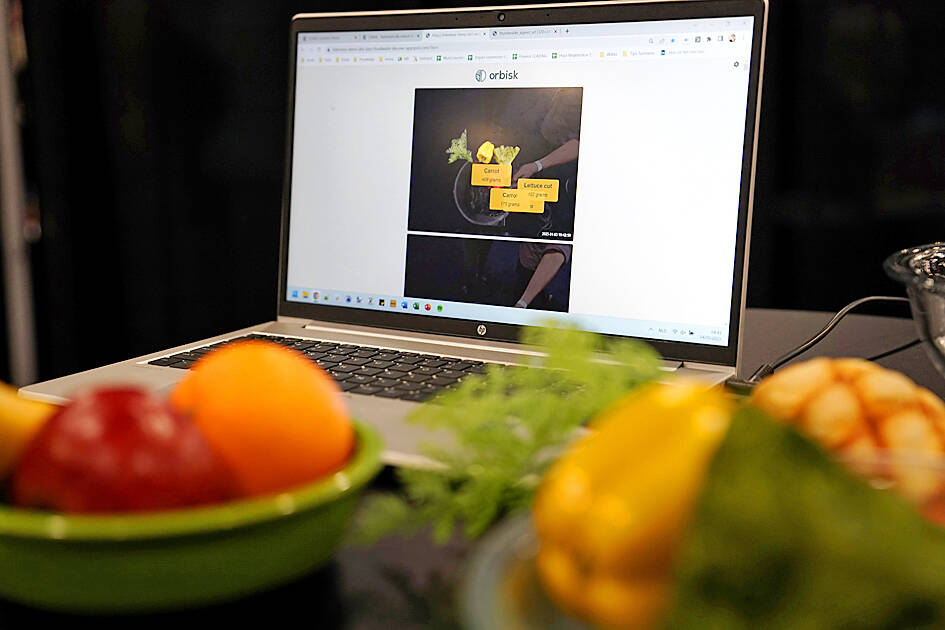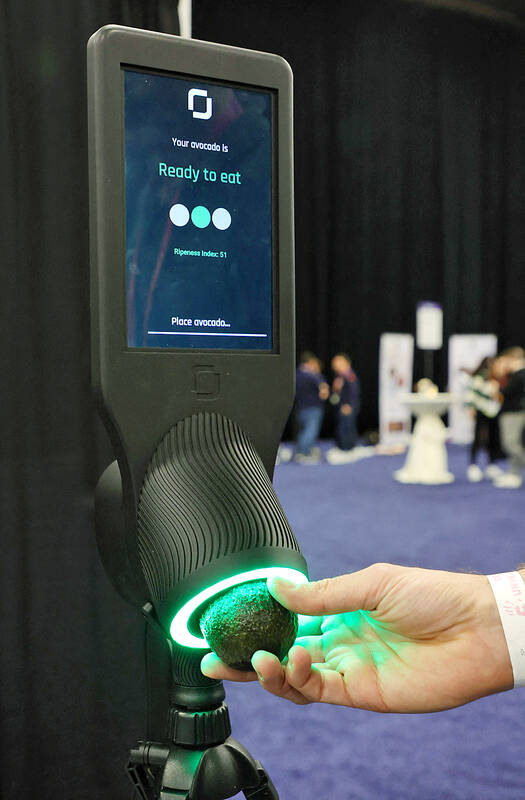Avocados can be tricky. Their ripeness window is so narrow that a slew of memes poke fun at the fine art of deciding when to eat them.
Dutch entrepreneur Marco Snikkers aims to solve that problem with an avocado scanner unveiled this week at the Consumer Electronics Show (CES) in Las Vegas, Nevada, and designed for use in supermarkets.
It uses optical sensing and artificial intelligence technology to determine ripeness, displaying on a screen whether an avocado is firm or ready to eat.

Photo: AP
Snikkers’ start-up, OneThird, is not just trying to reduce frustration in the kitchen.
According to the UN, about one-third of food is wasted globally.
That means all the carbon emitted to grow, ship and distribute that food was for naught.

Photo: AFP
“That’s a huge problem,” Snikkers said. “That’s a trillion dollar issue for our world, and it has a huge impact on C02 emissions and water usage.”
OneThird is one of several start-ups at this year’s CES working to solve different components of the problem, from helping the food industry limit what it throws away to offering rapid composting solutions to help keep food scraps out of methane-producing landfills.
OneThird says it already works with growers, distributors and others along the supply chain to predict the shelf life of avocados, tomatoes, strawberries and blueberries.
It plans to expand its ability to determine ripeness for more produce later this year, aiming to help reduce the amount of food that is wasted around the world.
It is testing the consumer-friendly avocado scanner at a supermarket in Canada this month.
Another Dutch entrepreneur, Olaf van der Veen, is working to empower restaurants to reduce food waste, the majority of which happens in a kitchen before a meal is even served to customers.
His device, Orbisk, uses a camera positioned over a trash bin to scan whatever food is about to be tossed.
In addition to seeing the type of food, amount and time of day, “we can see if it’s on a plate, in a pan, on a cutting board, which gives circumstantial information on why it was lost,” Van der Veen said.
Orbisk organizes and shares that insight with the restaurant so they can understand their disposal patterns, helping them save money and reduce food waste, and with it, emissions and water use, he said.
The start-up’s devices are positioned in commercial kitchens in about 10 European countries, with some clients as far as India.
He said that even after some surplus food is donated, there is more food waste per restaurant in the US than in Europe.
That is why the company is at CES, hoping to expand its nascent market further, he added.
Reducing the amount of wasted food is preferable, but keeping tossed food out of landfills is the next best option.
When food scraps are properly composted, they release carbon dioxide as part of the biological process of turning into nutrient-rich soil.
When food is trapped in landfills, the decomposition process produces methane — a potent greenhouse gas that contributes significantly to global warming because it packs a stronger short-term punch more than 80 times stronger than even carbon dioxide.
The 2006 London Protocol banned dumping food waste into the ocean, prompting South Korea to set up a system of mandatory composting.
While the infrastructure allows the country to properly dispose of nearly all its food waste, residents have to haul bags of food to designated curbside bins.
Reencle is designed to make that process easier.
The metal bin is a fast composting system showcased at CES this year, and helps households reduce 1kg of food scraps by 90 percent volume in just 24 hours, the company says.
While the product has sold tens of thousands of units in South Korea, Reencle’s parent company Hanmi Flexible hopes to expand to overseas markets, marketing director Jinhwi Bang said.
The device uses self-replicating microorganisms to turn scraps into compost.
Its competitor, Lomi, grinds and dehydrates food scraps, requiring the byproduct to be mixed with soil before composting, whereas Reencle says its byproduct can be composted directly.
Mark Murray, executive director of Californians Against Waste, said he hopes people do not think advanced technology is needed to be able to compost.
He said he understands that not everyone has a yard or a patio, and that “all of the tools in the toolbox have to be on the table.”
Technology is part of the solution, but economic incentives and systemic change are the other key components to reducing global food waste, he said.
“We need to make it more expensive to waste food,” he said. “That’ll create the incentive for commercial enterprises, for restaurants, for stores, for even consumers to invest in systems and technology for making sure that we don’t waste food.”

Taiwan would remain in the same international network for carrying out cross-border payments and would not be marginalized on the world stage, despite jostling among international powers, central bank Governor Yang Chin-long (楊金龍) said yesterday. Yang made the remarks during a speech at an annual event organized by Financial Information Service Co (財金資訊), which oversees Taiwan’s banking, payment and settlement systems. “The US dollar will remain the world’s major cross-border payment tool, given its high liquidity, legality and safe-haven status,” Yang said. Russia is pushing for a new cross-border payment system and highlighted the issue during a BRICS summit in October. The existing system

Convenience store operator Lawson Inc has registered trademarks in Taiwan, sparking rumors that the Japanese chain is to enter the local market. The company on Aug. 30 filed trademarks for the names Lawson and Lawson Station, according to publicly available information from the Ministry of Economic Affairs’ Intellectual Property Office. The product categories on the application include some of Lawson’s top-selling items for use in the convenience store market. The discovery has led to speculation online that the popular Japanese chain is to enter the Taiwanese market. However, some pointed out that it might be a preemptive application to avoid others from co-opting the

Taiwan Semiconductor Manufacturing Co (TSMC, 台積電) is expected to grow its revenue by about 25 percent to a new record high next year, driven by robust demand for advanced technologies used in artificial intelligence (AI) applications and crypto mining, International Data Corp (IDC) said yesterday. That would see TSMC secure a 67 percent share of the world’s foundry market next year, from 64 percent this year, IDC senior semiconductor research manager Galen Zeng (曾冠瑋) predicted. In the broader foundry definition, TSMC would see its market share rise to 36 percent next year from 33 percent this year, he said. To address concerns

Intel Corp chief financial officer Dave Zinsner said that a formal separation of the company’s factory and product development divisions is an open question that would be decided by the chipmaker’s next leader. Zinsner, who is serving as interim co-CEO following this month’s ouster of Pat Gelsinger, made the remarks on Thursday at the Barclays technology conference in San Francisco alongside co-CEO Michelle Johnston Holthaus. Intel’s struggles to keep pace with rivals — along with its deteriorating financial condition — have spurred speculation that the next CEO would make dramatic changes. That has included talk of a split of the company’s manufacturing